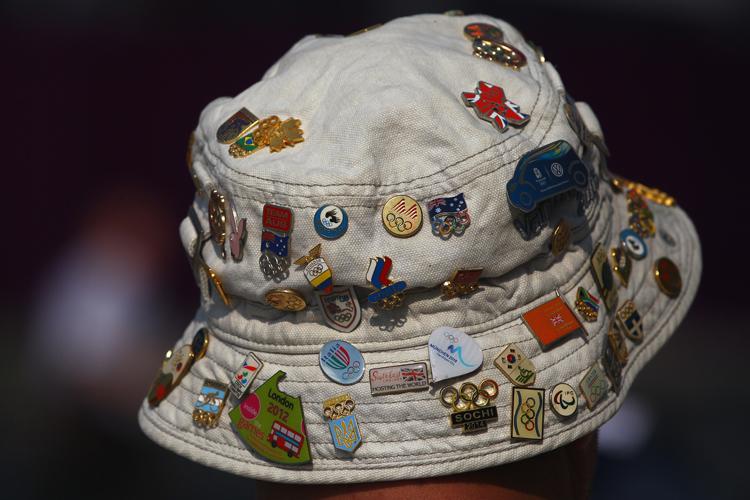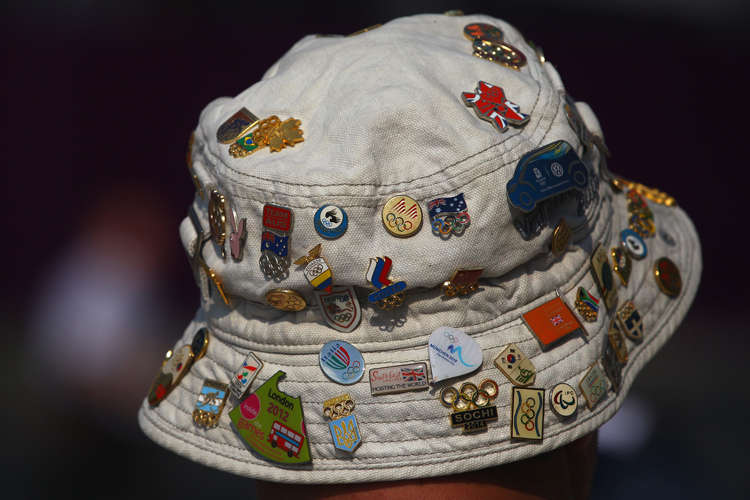LONDON—More than a souvenir racket, pin trading is an Olympic tradition. Veteran pin traders have followed the games all over the world for decades. Some do it for the collector’s pride of nabbing a rare pin, some do it for the money—many do it for both.
The little pins, or badges as they are called in the U.K., range in price from 3 pounds to 30 pounds ($4.70 to $47). The rare pins can sell for even higher.
Most sought after are the limited-edition pins given to athletes—usually Olympic rings with the name of their respective countries or flag. Prized too are media pins, such as the NBC “Today Show” Olympic pins which, word has it, will soon be a hot item in London.
Worthless on the pin market are mass corporate giveaways, or pins that don’t carry either the Olympic rings or the host city name.
Carsen, a veteran Olympic pin trader from Germany, arrived at London’s Olympic Park Wednesday evening and immediately saw a familiar face. He greeted “Max” (a pseudonym), a New Yorker who has traded pins at eight Olympic Games.
Max tried to recall where he and Carsen first met. “Was it Lillehammer?”
“No, we met at Nagano in ‘98,” said Carsen. Word among the veteran pin traders is that Nagano, Japan, was the most profitable pin-trading venue—a trader from L.A. said after he paid his bills and settled his credit card debt, he returned home with $10,000 cash after only five days of selling in Nagano.
Many traders express uncertainty about the outlook for the London pin trade.
Nipping Trade in the Bud
Max recounted to Carsen the run-in he just had with security. He was on the outskirts of the Olympic Park near a bus station.
“They had cameras on their chests pointing at me as they spoke to me,” said Max.
“They took my name and information ... [and] said if I get caught again, I will be prosecuted.” He was visibly agitated and flush with anger. The security officers told Max that even trading pins, not selling, could lead to prosecution.
“I’ve had some pins confiscated before and I’ve had officers tell me to move or pack up,” recalled Max of previous Olympic years, but he was never threatened with prosecution or warned not to trade.
He hopes that in areas further from the Olympic Village, perhaps Hyde Park, with high tourist traffic he will be able to ply his trade in peace.
Alex Ternowetsky from British Columbia, Canada, began trading and selling pins at the 2010 Winter Games in Vancouver.
“I sold about $1,000-worth of pins a day,” said Ternowetsky of the Vancouver Games. “They shut down other vendors instantly, people selling T-shirts and other trinkets, but left the pin sellers alone,” he said.
The pin craze has not hit London full force yet, but Ternowetsky is certain it will.
As people passed by, he asked if they were interested in pins. When they said, “No,” he responded, “In a few days, you will be!”
Carsen is not in London to sell and trade pins this time. He is here to sell tickets, which he says will be more difficult than pins. Olympic organizers have quadrupled the fine to 20,000 pounds for scalping, or touting as it’s called here, to thwart organized crime, and possibly terrorists gaining illegal entry to events.
Carsen saw security officers questioning two people who were looking for tickets outside the Olympic Park.
“Maybe they will send me on a plane to Cuba if they catch me,” he joked, “Maybe they will send me to Guantanamo Bay.”
The Epoch Times publishes in 35 countries and in 19 languages. Subscribe to our e-newsletter.







